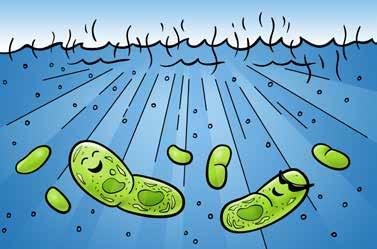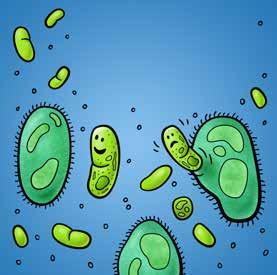
1 minute read
Comic: Ancient Origins of Photosynthesis

The origin of photosynthesis is a tale of
Advertisement
biological thievery that started billions of years ago.
Hey, something is different about you.
It’s too late. Onward and upward!
Back then, sulfur-dependent organisms lived on the ocean floor, gleaning energy from hydrothermal vents.
Muuch later...

Wait, I forgot something.
Ahhh, I’m so happy we moved. Me too.

Some bacteria developed “oxygen-evolving complexes” and “chlorophyll reaction centers,” allowing them to extract electrons from water using light from the sun. The evolutionary innovations led to an exodus, and the first photosynthetic pioneers left for more well-lit pastures.

Never seen you around these parts. Hey Paul, come meet my new friend!
Complexity became the name of the evolutionary game and soon single-celled eukaryotes arrived on the scene. A hungry eukaryote eventually gobbled up cyanobacteria and through a process called endosymbiosis integrated the bacteria’s lightfeeding properties into its own biology. In a Goldilocks Zone near the surface, cyanobacteria soaked up sunlight and produced oxygen, changing the makeup of the Earth’s atmosphere.









